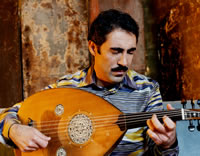 Oud
Master Revitalizes Arab Music, Pioneers Fusion
Oud
Master Revitalizes Arab Music, Pioneers FusionTue Mar 2, 2004 08:03 PM ET
By Andrea Shalal-Esa
WASHINGTON (Reuters) - Palestinian-American oud virtuoso Simon Shaheen regularly sells out concerts around the world. His CD "Blue Flame" garnered 11 Grammy nominations after it was released in 2001, and he even got a mention in popular writer Diana Abu-Jaber's new novel "Cresent."
Musician, composer and educator, Shaheen has worked relentlessly since coming to the United States in 1980 to share the richness and complexity of traditional Arabic music with Western audiences, as well as pioneering a new direction in fusion that blends Arabic music with jazz and Latin beats.
The 49-year-old, conservatory-trained musician performs some 100 concerts a year; hosts a regular Arabic music retreat in Massachusetts and organizes an annual week-long Arab culture festival in New York City, complete with henna-painting lessons, folk dancing and plenty of Middle Eastern food.
An oud is a pear-shaped, short-necked string instrument popular throughout the Middle East. A forerunner of the European lute, the oud has a long history dating back to ancient Egypt.
"Simon really put the classical back into the Arab music tradition," says Anne Rasmussen, a music professor at the College of William and Mary in Virginia and director of the school's Middle Eastern Music Ensemble.
"He's brought all this respectability back to the music," said Rasmussen, referring to a U.S. Arab music scene dominated mainly by nightclub acts and bellydancing music in American cities in the 1970s.
Abu-Jaber, an Arab-American writer and University of Miami professor, says Shaheen had a profound effect on her own work.
"When I first heard a Shaheen tape in college, I felt this very deep excitement, a sense of discovery," she says. "This was one of the first and most moving testimonials I'd heard to the passionate depth of Arab culture, and it inspired me to want to pay the same tribute in my own work as a writer."
Next month, Shaheen kicks off a nationwide tour with the Near Eastern Music Ensemble, a band he started in 1982, including a sold-out March 27 show at New York's famed Carnegie Hall and stops in Stanford, California, Pittsburgh and Seattle.
At the end of the month, he plans to record a second CD with Qantara, Arabic for "arch," the fusion band that made 2001's "Blue Flame" his biggest success to date and includes Arab, American and French musicians, among others.
TEACHING PALESTINIAN YOUTHS
Despite his hectic schedule, Shaheen will find the time this April to spend 10 days teaching a group of 50 to 60 gifted young Palestinian musicians in the occupied West Bank.
He says many of the youths aged 12 to 18 must cross the rugged Biblical terrain on foot, their instruments and luggage in tow, due to Israeli road blocks and closures.
"They come like a dead rose," Shaheen says, but after more than a week of intense performing, discussion, lectures and fun, the youths leave refreshed and committed to continuing to explore their rich history and culture through music.
"It's like a dream they lived for 10 days," Shaheen says in an interview.
But then, he adds somberly, they must return to a world filled with violence and hatred, a situation that leaves even the indomitable Shaheen struggling for some semblance of hope.
"Hope? I don't sense it," he says. "There are so many facts that have to be changed, and who's willing to do so?"
Shaheen's family has seen its share of grief in the Israeli-Palestinian conflict. His mother and father -- an oud player, composer and conductor -- fled to Beirut with his young siblings during the 1948 war, when their village Tarshiha was the last Palestinian village to fall under Israeli control.
Two and a half years later the Shaheen family managed to return to the village and the land they owned, stealing over the border under the cover of night after a treacherous journey across the mountains of southern Lebanon.
They eventually got Israeli identity cards, but over 50 years later, Shaheen is still fighting for the return of 26 dunum, or about 6.25 acres, of olive trees atop a Tarshiha hillside.
CHILD PRODIGY
Simon was born in 1956 into a musical family that regularly listened to famous Arab classical music, jazz, West African and Indian music, soon becoming a prodigal oud and violin player.
The striking, dark-haired musician says he still has the small oud that his father bought him when he first started to play at the age of four-and-a-half.
He plans to donate the beloved instrument and a photograph from that time to the new Arab American National Museum that will open its doors in Dearborn, Michigan, next January.
In 1980 he moved to New York and has lived there ever since, although he says it still doesn't quite feel like home. "Where ever I perform at night, this is my home," says Shaheen.
Shaheen still loves to play traditional Arabic music and the new tour will honor the work of Egyptian composer Mohammed Abdel Wahab, whose music Shaheen recorded on a 1991 CD, and the legendary Egyptian singer Oum Kalthoum.
But he sees the fusion work with Qantara as the culmination of his life's work -- a new genre that "crosses cultures and styles. With this genre, we have arrived at something new, yet perfectly natural -- the sound of one world."
Reuters/VNU
Source: http://www.reuters.com/newsArticle.jhtml?type=topNews&storyID=4511165